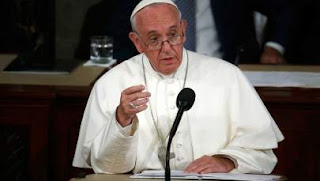This past week a man slightly
hunched beneath the weight of his hulky white robes came sharing a gospel of
advice to our nation and some thought, “Not my Pope.” Easily discrediting his
wisdom, his science, and his humanity as dogmatic Catholicism, and defaulting
with the pigheaded--and quickly becoming cliché--, “I am not Catholic; I’m such
and such.”
In his address to congress, the
Pope encouraged immigration reform and a welcoming support for the refuges of
war torn nations, abolishment of the death penalty, and spent the climax of his
address asking for environmental considerations to battle global climate
change. It’s easy to call these political issues and accuse the pontiff of
meddling in politics. It’s even easier to generalize these as catholic issues
and since nearly all politicians claim to be laity of one church or another,
allow issues to create more polarization between not only denominations but
also congressional officials.
From the Gospel of Mark, the ninth
chapter, “John said to Jesus, ‘Teacher, we saw someone casting out demons in
your name, and we tried to stop him, because he was not following us.’ But
Jesus said, ‘Do not stop him; for no one who does a deed of power in my name
will be able soon afterward to speak evil of me. Whoever is not against us is
for us. For truly I tell you, whoever gives you a cup of water to drink because
you bear the name of Christ will by no means lose the reward.”
How can Christians doing deeds in
the name of Christ come together? How often do we try and intervene in the
midst of an “exorcism” and wind up just getting in the way of something good
happening—something Godly. We allow our naïve branding of denominations and
labeling of ideas to block the greater good that is happening. We partition
ourselves and let biases become burdens preventing concord and a means to work
together productively.
Jesus knew his disciples needed to
learn this lesson so that the kingdom of God would spread. When we see and hear
the promise of Christ spreading in all its acts and tongues, it is something to
lift up, something to rally behind, not divide by. We needn’t label it as a
Lutheran way, or a Methodist way, or a Presbyterian way, or a Catholic way,
because no one doing a deed in the name of Christ will speak evil of him. Not
only do we owe one another confirmation of our prevailing beliefs, but
affirmation we all serve a fraternal greater good. As the Pope distinctly said,
“We must move forward together, as one, in a renewed spirit of fraternity and
solidarity, cooperating generously for the common good.”
Post one in a series of five posts for a class at Luther Seminary this semester: "Dietrich Bonhoeffer, Eleanor Roosevelt, and Martin Luther King Jr. in Dialogue with Public Theology Today."


